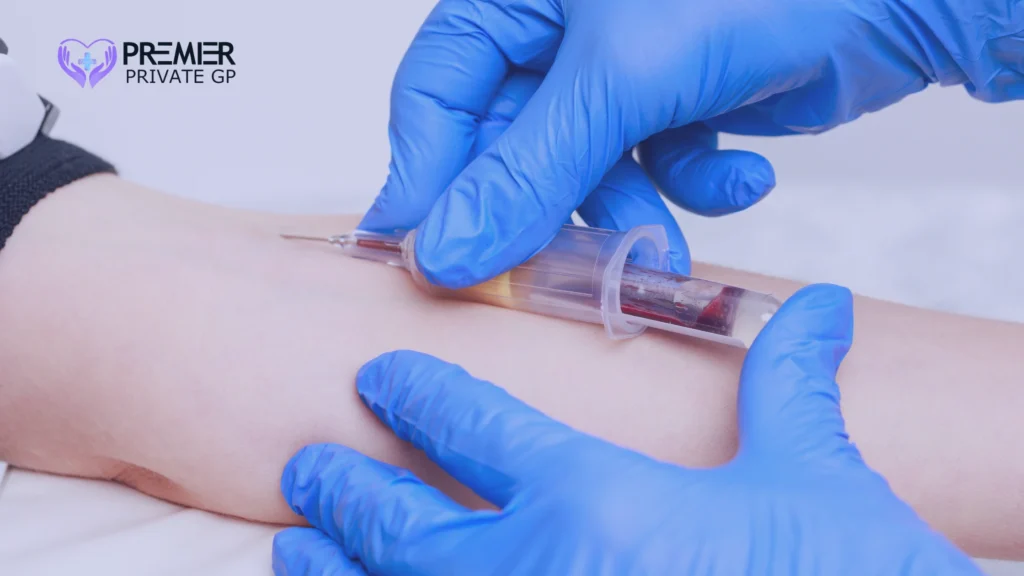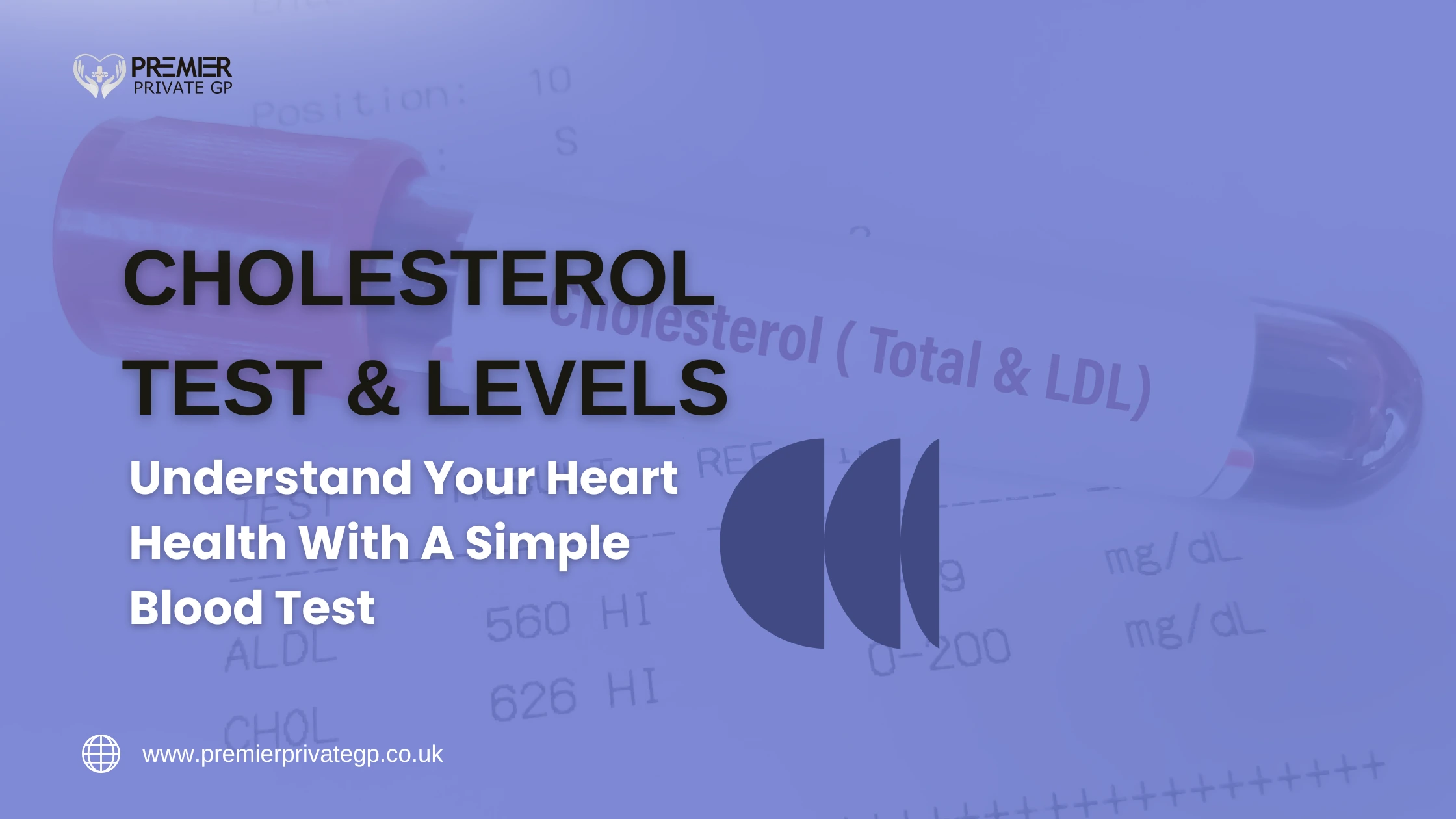One of the most common questions people ask is: “Do I need a cholesterol blood test, and what do those numbers actually tell me?” Well, it tells a lot about your health and lifestyle. At Premier Private GP in Bagshot, Surrey, we routinely offer cholesterol testing as part of health screening to help you understand your cardiovascular risk and take proactive steps to protect your health.
In this blog, let’s cover everything you need to know from how cholesterol tests work in the UK, to understanding cholesterol levels by age, to tips you can use immediately.
Read why Preventive Health Screening in Your 30s, 40s, and 50s is important.
Why Getting a Cholesterol Blood Test Matters
Cholesterol is a fatty substance which is used in your body to build the cells, but when there is excess of any type (which is basically LDL and non-HDL), it may block the arteries and lead to the possibility of heart disease. A cholesterol test/ lipid profile is a test that is taken to determine your total cholesterol, LDL, HDL and triglycerides.
Checking your cholesterol is part of comprehensive preventive care no matter if you’re young or older in age. Many heart attacks and strokes occur in individuals who believed that their health was fine. Having a cholesterol blood test in the UK through your GP or through private screening gives you clarity and power to act.
In plenty of our health screening packages, like cholesterol tests, we show you a complete picture.

How Does the Cholesterol Blood Test Work (Fasting vs Non-fasting)?
You may wonder: “Do I need to fast before a cholesterol blood test?” Today, in most cases, non-fasting cholesterol screening is adequate in regular screening. However, in case of an abnormal first result or a desire to be precise, your doctor can take a cholesterol blood test that you fast on by not having any food 8-12 hours before.
Fasting tests reduce fluctuation from recent meals, giving a more consistent measurement of triglycerides and LDL. We will always guide you on whether your test needs fasting, and our experienced staff handle all the logistics during your private blood test session at our clinic.
We always inform you whether your test requires fasting and our professional staff does all the logistics in the process of your private blood test at our clinic.
Cholesterol Levels by Age
Cholesterol naturally changes with age. A reference chart can help you to determine whether your numbers are good in terms of your age.
| Age Range | LDL Target (mg/dL / mmol) | HDL (ideal) | Total Cholesterol (ideal) |
| 18–30 | < 3.0 mmol/L (~115 mg/dL) | ≥ 1.0 mmol/L | < 5.2 mmol/L |
| 31–45 | < 3.0–3.5 | ≥ 1.1 | < 5.5 |
| 46–60 | < 3.5–4.0 | ≥ 1.2 | < 5.5–6.0 |
| 60+ | < 4.0 | ≥ 1.2 | < 6.0 |
These are guidelines; a person might be at risk, e.g. family history, diabetes, heart disease, etc., which changes optimal targets.
The additional, UK-specific charts are available through outside sources such as the British Heart Foundation.
If you’d like to see your own numbers contextualised for your age, you can opt for our private cholesterol test at Premier Private GP.
Serum HDL Cholesterol Level (the Good Cholesterol)
One of the key numbers your test will show is serum HDL cholesterol level HDL is often called good cholesterol because it helps carry excess cholesterol back to the liver for disposal. In many cases, an increase in HDL is preventive of heart disease.
When your LDL level is great and your HDL level is also good, you may have a lower cardiovascular risk than one with low HDL. With that being said, HDL is not the only segment of the puzzle. It should be your entire lipid profile and other risk factors (blood pressure, smoking, glucose).
Cholesterol Test Results: What they mean and what to do next
When your results arrive, here’s how we at Premier Private GP help you interpret them:
- We review total cholesterol, LDL, HDL, and triglycerides together
- Evaluate your risk factors (age, family history, diabetes, smoking)
- In case of borderline or high numbers we might advise of repeat testing, lifestyle change or medications.
- We can make dietician or cardiology referrals when it is needed.
Explore our private medical referrals.
Our goal is to help you understand so you’re empowered to make wise health decisions.
How to Improve Cholesterol in 7 Days & Beyond
Although you will not be able to turn years of cholesterol accumulation around in one night but with effort you can make some real progress.
- Diet makeover: Remove processed food, red meat, and refined sugars and saturated fats from your diet. Increase fiber (legumes, oats, vegetables).
- Healthy fats: Include sources of monounsaturated and polyunsaturated fats (e.g., olive oil, nuts, oily fish).
- Exercise: even light exercise works on a daily basis – a 30-minute brisk walk can start working on the lipid metabolism.
- Hydration and sleep: hydration and quality sleep are beneficial to overall body metabolism.
- Avoid smoking or alcohol: Both are damaging to cholesterol and heart health.
These measures when adhered to can start altering your cholesterol levels within one week and greatly in the long term.

Our Clinic Support
If your cholesterol results are significantly high, or you have multiple risk factors (family history, diabetes, hypertension), it’s necessary to act quickly. Untreated high cholesterol increases the risk of heart attacks, strokes, and peripheral vascular disease.
At Premier Private GP, we provide not just testing but full support:
- Same-day GP consultations to review your results
- Lifestyle counselling and monitoring
- Referrals to cardiology or dietician specialists via our private referrals mechanism
- Follow-up testing and care planning
Start understanding your heart health now.
FAQs
What is the benefit of good cholesterol in our health?
Good cholesterol (HDL) helps in clearing out the heart cholesterol that is out in your arteries reducing the chances of heart disease and stroke. It is a vascular cleanser, which promotes heart health in general.
How to reduce cholesterol in 7 days?
Pay attention to dietary modifications (eliminating saturated fat, increasing fiber), exercise, water, and alcohol and alternative foods. Although the significant changes require time, such steps can start to affect your levels in a positive way in the nearest future.







